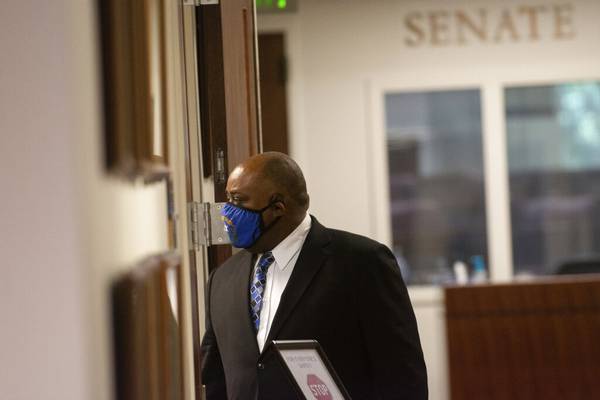CARSON CITY — On the last day of the special legislative session, Nevada lawmakers passed a bill providing businesses with liability protection from coronavirus-related lawsuits.
The bill grants legal immunity to most businesses, nonprofits and government agencies as long as they follow health standards set by local, state and federal authorities and don’t exhibit “gross negligence."
Lawmakers added an amendment excluding schools from the liability protections extension after teachers and education activists spoke against their inclusion. Many private health care providers had already been left out of the bill.
Hospitals were left out of the bill, state officials said, because Gov. Steve Sisolak’s declaration calling a state of emergency already extended liability protections to hospitals.
The Nevada State Education Association, in a statement, said “the collective voice of educators” caused the change and removal of schools.
The bill passed the Senate with Sens. Pete Goicoechea, R-Eureka, Ira Hansen, R-Sparks, Joe Hardy, R-Boulder City, James Settelmeyer, R-Gardnerville, and Marcia Washington, D-Las Vegas, voting against the measure.
Many Republicans in the Senate who voted for the bill, such as Reno Sen. Ben Kieckhefer, had issues with the exclusion of schools but supported it due to overarching concerns about businesses being able to operate.
“While I can find a couple easy ways to vote no, getting people back to work will put me to yes every day of the week that ends in Y and twice on Sunday,” Kieckhefer said.
Sen. Scott Hammond, R-Las Vegas, voted for the bill because of the protections it offers businesses, but said exemptions amounted to “picking winners and losers.” He protested a final-hour amendment that exempted schools because he said exposure to liability would make reopening schools more difficult and, in turn, hurt students.
Teachers’ union representatives said the threat of liability would force schools to only reopen when safe for students, teachers and support staff.
“If there is immunity, there is no incentive to ensure these classrooms, buildings, campus, and buses are safe ... We believe removing immunity from schools forces districts to adopt a safety and testing program,” Clark County Education Association President John Vellardita said.
Senate Minority Leader James Settelmeyer raised concerns about backroom negotiations over the amendment removing schools from the liability protections. Brin Gibson, the governor’s interim general counsel, said the bill was drafted with input from key players.
“The way this bill came about is it was a negotiation among some of the most important members of the Nevada economy,” Gibson said. “They struck this language, and they decided, based on the various weights and balances that are out there, that these elements should be include here in this way.”
In the Assembly, the bill passed 31-10, with one member absent. Members of both parties voted against the bill, and lawmakers who rose in favor of the measure seemed to do so reluctantly, with many stating they wished the bill went further.
Assemblyman Glen Leavitt, R-Boulder City, said the bill “has the potential of being close to perfect.”
“Thank you to all my colleagues who tried to make it perfect, but unfortunately it fell short of that goal. My hope is that in the future we will work better to get as close to perfect for Nevada as we can,"Leavitt said.
Assemblywoman Selena Torres, D-Las Vegas, spoke against the bill, stating it favored casino workers without spreading protections.
“I cannot in good conscience support blanket liability without codifying additional worker protections for all workers in the state of Nevada,” Torres said.
Assemblywoman Dina Neal, D-North Las Vegas, said voting for the bill was “one of the most painful votes” she’d taken in the Legislature.
“We push policy and we think about the black and white, but it’s always gray; it’s always somewhere in the middle,” Neal said.
The Culinary Workers Union Local 226, a politically powerful player that worked on the worker protection aspects of the bill, released a statement celebrating its passage.
“The worker provisions in the Senate Bill 4 are the result of five months of the Culinary Union having thousands of one-on-one conversations with workers, two different car caravans on the Las Vegas Strip with over 10,000 Nevadans participating, dozens of public comments before the Nevada Gaming Control Board and Gaming Commission, and drafting, researching and consulting with experts on the health and safety language in the bill,” said Geoconda Argüello-Kline, the secretary-treasurer of the union.
The Nevada Workers Coalition, a unit of progressive groups from around the state, expressed its “grave disappointment” in the passage of the legislation.
“Had this bill included safety provisions for all of Nevada workers, and did not include unnecessary immunity provisions we would have supported S.B. 4 wholeheartedly,” the coalition said in a statement. “Instead, this bill fails to protect all workers in Nevada. This is blatantly unfair and especially disrespectful to those other workers left out of this bill who have already died as a result of being an essential worker.”
If Sisolak signs it as expected, Nevada will join more than a dozen states that have passed laws to protect businesses from personal injury and wrongful death claims amid the pandemic.
The Associated Press contributed to this report.

